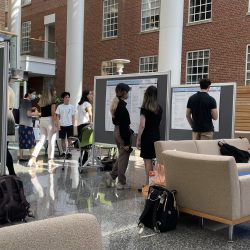The Abstract: August 15, 2022

August 15, 2022
Whether you’re local or global, student or alumni, the Abstract’s weekly news digest will help you stay in the loop with our amazing Gillings School community.
Hincapie-Castillo publishes new study assessing COVID-19 dashboards in FL public schools

Dr. Juan Hincapie-Castillo
Juan Hincapie-Castillo, PharmD, PhD, assistant professor of epidemiology, has co-authored a new study that examines the need for improved COVID-19 surveillance dashboards in Florida public schools.
Published in Frontiers in Public Health, the study compared publicly available dashboards that tracked COVID-19 cases in the Florida public school system during the 2021-2022 academic year and found that 34% of counties had no dashboard at all. Those that did have dashboards varied widely in terms of available data, visualizations and overall framework. The counties with the highest median income also maintained the most high-quality dashboards, suggesting a lack of resources or infrastructure to maintain data reporting systems in underfunded counties and underscoring the significant challenge that decentralized tracking poses.
Variances in dashboard quality make it close to impossible for public health officials to conduct a meaningful pandemic response and limit the spread of the coronavirus among children. It also makes it difficult for researchers to understand current and emerging trends and for parents to make the most informed decisions about their child’s health and safety.
“Without a centralized coordinated response by the State to provide a basic infrastructure for COVID-19 dashboards, school districts are left on their own to design these systems,” said Hincapie-Castillo. “The problem with this approach is the resulting wide differences in data collection and reporting, and we know airborne viruses do not stay within man-made boundaries. If you are a parent of school-aged children, how are you supposed to act if there are no data for cases in schools from the nearby neighboring counties?”
The results of this study can help inform other states on best practices for creating infection case dashboards. The authors argue that these surveillance systems must be informed by end-user attitudes and preferences.
Rothenberg named RTI International’s 2022 Mentee of the Year

Maggie Rothenberg
RTI International’s employee resource group, “Young Professionals,” annually awards staff members who exude excellence in mentorship. Master of Public Health student Maggie Rothenberg is RTI’s 2022 Mentee of the Year.
Rothenberg began her RTI journey in the summer 2021 as a health research analyst intern. Embracing all of the opportunities of mentorship, Rothenberg progressed from intern to full-time contractor to full-time employment in March 2022. In addition to being an exceptional mentee, Rothenberg is empowering the next generation of health leaders by mentoring interns on her team within RTI’s social, statistical and environmental Sciences business unit.
RTI’s year-round internship program is administered by the University Collaboration Office.
Patil wins poster presentation award from Department of Biostatistics

Students participate in the 2022 BUSI Research Symposium.
Congratulations to Sarthi Patil, who was honored with the Best Poster Presentation Award at this year’s Department of Biostatistics Undergraduate Summer Internships (BUSI) Research Symposium. The symposium is the culmination of the summer research experience for BUSI interns. It offers them a space to engage with fellow students, faculty and the community while discussing their research projects. Patil’s mentor was Laura Raffield, PhD.
Photos of the event can be viewed via Dropbox or Google Drive.
Shook-Sa and Hudgens co-author new paper estimating HIV prevalence in NC jails

Dr. Bonnie Shook-Sa

Dr. Michael Hudgens
Assistant Professor Bonnie Shook-Sa, DrPH, and Professor and Associate Chair Michael Hudgens, PhD, from the Department of Biostatistics, have co-authored a new study in the Journal of the Royal Statistical Society estimating the number of people living with HIV in North Carolina jails.
The article, “Estimating the number of persons with HIV in jails via web scraping and record linkage,” presents methods to estimate the number of people living with HIV in N.C. jails by applying finite population inferential approaches to data collected using web scraping and record linkage techniques. Administrative data are linked with web-scraped rosters of incarcerated persons in a non-random subset of counties. Outcome regression and calibration weighting are adapted for state-level estimation. Methods are compared in simulations and are applied to data from the state of N.C. Outcome regression yielded more precise inference and allowed for county-level estimates, an important study objective, while calibration weighting exhibited double robustness under misspecification of the outcome or weight model.
